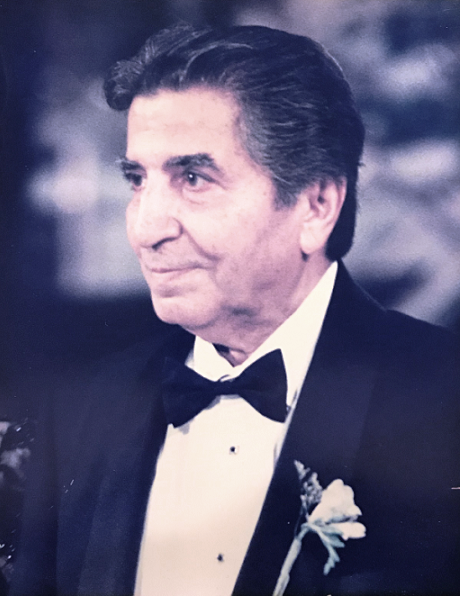
Khalil Nahai — One of the founders of Alborz Insurance, a merchant, a senior government advisor, and a philanthropist
Khalil Nahai was born into a religious Jewish family in 1917 in Tehran, in the Oudlajan neighborhood. His father, Aghajan, was a respected community member, and his mother, Khatun Jan, was an educated and wise woman. Khalil Nahai completed his primary and lower secondary education at Noor-e Sedaghat School. He entered university in 1936 when he was sixteen. Within three years, he received his diploma in agriculture from the Agricultural College in Karaj from the King himself. He then attended the Teacher Training College of Sciences and obtained a bachelor’s degree in education after five years. This allowed him to join the first group of young Jews who broke through the barriers and pursued higher education.

After completing his studies, Khalil Nahai became involved in various activities. Initially, he joined his brothers in their business and worked with them in the representation of Yorkshire Insurance in Iran, which was under the supervision of his elder brother, Habibollah Nahai. Later, he co-founded Alborz Insurance Company alongside his brothers. Subsequently, he established one of the largest international shipping companies in the private sector and achieved significant financial and professional success within a short period. This led to his international recognition. The intelligence and competence that he demonstrated made Khalil Nahai an internationally recognized name, known as a successful Iranian Jewish merchant with the credibility to work with global shipping and insurance companies. Additionally, his astuteness and efforts in commerce brought him remarkable success, making him one of the government’s commercial advisors in insurance matters, particularly transportation and shipping.

Khalil Nahai began his philanthropic activities at a young age when the world was engulfed in the flames of World War II and its destructive effects had engulfed Iran too. Like his fellow compatriots, he provided remarkable and valuable services in facilitating the migration of war-stricken Jewish refugees and Polish asylum seekers who sought refuge in Iran. He also selflessly assisted in the settlement, nourishment, and medical care of Iraqi Jewish immigrants to the best of his abilities, without any self-promotion. Additionally, he continuously supported the poor regardless of their group, provided material and spiritual assistance to the youth who wanted to start a married life, irrespective of their faith and religion, and offered intellectual and financial support to impoverished and broken families. These are just a few examples of the compassion and humanism demonstrated by this noble and human-loving individual in his philanthropic endeavors.
More of Khalil Nahai’s selfless contributions can be observed in his assistance in constructing the central mosque in Khorramshahr during his residency there. He also contributed to improving the living conditions of prisoners and providing aid to the needy in that city. Among his other friendly humanitarian services, he collaborated with the Jewish Elders Society in Tehran and several philanthropic institutions that were among the first organizations to benefit from his experience, efficiency, and love for community service. He also worked closely with the late Yousef Kohen in drafting inheritance laws for Jewish women and girls, aiming to secure equal rights for them. Moreover, his efforts in renovating and revitalizing the Esther and Mordekhai Tomb in Hamedan and expanding the renovation of Beheshtiye cemetery in Khavaran, Tehran, are some more examples of his outstanding services.

Another significant philanthropic endeavor of Khalil Nahai took place in 1975-1976 when the Cyrus schools faced the risk of closure due to a financial crisis, endangering the fate of hundreds of students in this prominent educational complex. In response, community officials sought assistance and support from Khalil Nahai to save and revive the Cyrus schools.
Khalil Nahai accepted the responsibility immediately and — with the joint efforts of the members of the Cyrus Schools Association — demolished the old school building. With his determination and the dedication of his colleagues at work, it only took a short period for him to construct a modern facility for the school, equipped with a library, laboratory, and classrooms using the latest engineering principles, transforming it into a prestigious cultural center. As a token of appreciation for Khalil Nahai’s valuable services in this endeavor, the Parents and Teachers Association of the Cyrus Schools presented him with numerous letters of commendation and a certificate of gratitude. It should also be noted that Khalil Nahai personally provided the necessary budget for the Cyrus Schools for several years.

The year 1947 marked the year that Khalil Nahai would marry his wife, Akhtar Nahai, from the Yousef Musa family. They have two sons and two daughters (Manijeh Javaheri, Bijan Nahai, Haydeh Eliyahoo, and Kamran Nahai), who are highly educated and actively involved in social work.
Akhtar Nahai’s maternal grandfather was Ezra Yaghoub, a well-intentioned figure in the Jewish community in the 1920s. The Ezra Yaghoub synagogue was built to fulfill his will. As for Akhtar Nahai herself, she was her husband’s support and encouragement for his social activities. She was among the women who collected donations for the reconstruction of the Cyrus Schools in the 1970s. During the thirteen years of Khalil Nahai’s absence from his family, she filled his place with complete wisdom and sheer loyalty. She actively participated in various social, cultural, and charitable activities as a member of the Hadassah Women’s Zionist Organization of America, B’nai B’rith, and Jewish Women International. As a result, in 2016, the Iranian Jewish Women’s Organization held a ceremony to honor her as a selfless and skilled lady.
Khalil Nahai was repeatedly arrested on false charges after the Islamic Revolution in Iran and sent to prison. He resisted with unprecedented courage. Eventually, with his unwavering faith in justice and the proof of his innocence — in addition to his humanitarian services — he was released after enduring more than a year of solitary confinement.
Despite enduring separation and numerous hardships, Khalil Nahai never forgot his responsibility towards his fellow beings. He continued to lend a helping hand until his last days. One of the essential characteristics of this enlightened personality — who inherited the spirit of service from his parents — was that as a faithful Jew and loyal to Judaism, he was one of the most renowned and successful individuals in economics and commerce while always striving to address societal issues without any consideration for personal gain. Despite having the opportunity to hold high positions and official titles in the country, he refrained from accepting any titles in various social organizations.
In 1992, after thirteen years of struggling through the ups and downs of life and separation from his family, Khalil Nahai immigrated to the United States. He settled in Los Angeles with his wife and children. Even during his retirement years and while suffering from cancer, he wholeheartedly responded to invitations to collaborate with public welfare organizations and charitable centers in Los Angeles, especially organizations such as “Magbet” and the “Elderly Charity Association.” Cultural institutions and other needy individuals also benefited from his experience, capabilities, and love for serving others. With his wisdom and boundless generosity, he breathed new life into several charitable institutions. Additionally, he nurtured the desire to establish a “National Fund” in exile, where assistance and support could be provided to all organizations, the general public, and those in need.
In January 1994, the Bene Sayun Charity Society honored Khalil Nahai as a devoted servant of the community and a figure who made the impossible possible through his creative power, genius, and social influence.
During a large gathering held in his honor, Khalil Nahai received a bravery medal, which he immediately — and sincerely — dedicated to his wife, saying, “Only you deserve this.” For years, Khalil Nahai spent his free time writing his memories, experiences, and philanthropic services. However, life did not give him the chance to publish his book.
After spending a lifetime adorned with love for his fellow human beings, Khalil Nahai bid farewell to the transient world in October 1995 at the age of 76, following a three-year battle with cancer. He embraced eternity.




 فارسی
فارسی